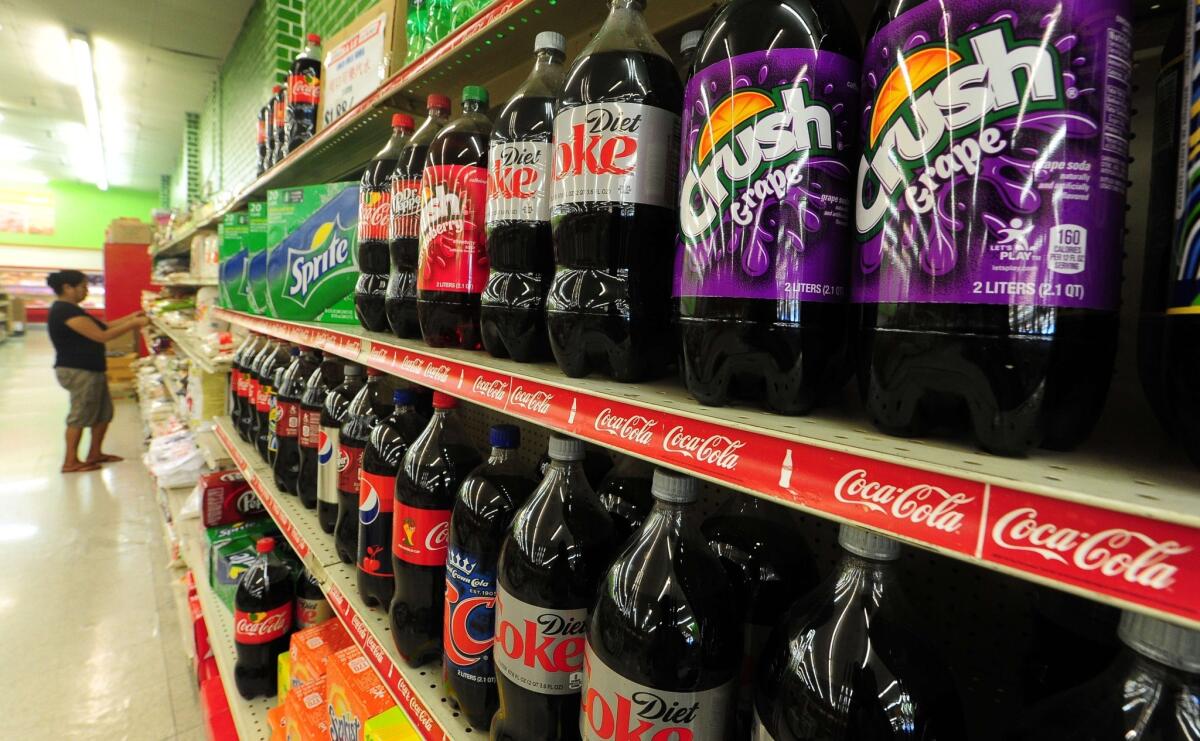Editorial: 2 state bills show when product labeling is helpful and when it isn’t

- Share via
The trend in government-mandated labeling — ingredients lists, nutritional breakdowns and safety warnings — is toward more rather than less, and for the most part that’s a good thing. Strong labeling laws give consumers the facts they need to make healthful, safe and responsible buying decisions.
At the same time, cluttering labels with redundant information or facts of questionable value only makes it harder to find the most useful information. It can even mislead.
But which labeling is vital, and how much is too much — or the wrong kind? Those questions can be difficult to answer. Two bills in the state Legislature provide helpful examples of when to label — and when not to.
AB 708, authored by Assemblyman Reggie Jones-Sawyer (D-Los Angeles), would require manufacturers of cleaning products, such as dishwashing detergents, spot removers, furniture polishes, and bathroom and kitchen cleansers, to list the ingredients on the labels, just as federal law requires for food, cosmetics and most personal care products, such as shampoo.
Considering the strong chemicals and potential allergens in many cleaning supplies, it’s surprising that this isn’t already the law. As with personal-care products, people have skin contact with cleaning supplies regularly, and are surrounded by them on furniture, floors and so forth. The California Department of Public Health has raised concerns about the use of some cleaning formulas in schools, saying, “They can cause or worsen asthma and release unsafe chemicals into the air.”
Of course, federal law is a better way to regulate such matters than patchwork state legislation. But Congress hasn’t been in the mood for such things: Several years ago, a mild consumer-information bill — requiring ingredients in cleaning products to be posted on the Internet but not printed on labels — was defeated.
Existing federal standards on cleaning products are so loose that they’re almost meaningless, and a voluntary labeling initiative by the industry has not led to noticeable improvements. Some manufacturers conscientiously list all ingredients; others list none; and a common approach is somewhere in between, listing categories of ingredients such as surfactants, stabilizers and “quality control agents” — terms that give consumers no specific information. Industry spokesmen say they’re concerned about giving away trade secrets, but this argument rings hollow. Similar complaints were made about the labeling of cosmetics ingredients, but since the law took effect there has been no apparent effect on companies’ ability to compete.
This bill would give Californians new and useful information about products they use every day.
In contrast, a repeat bill to require warning labels on soda and other sugary beverages isn’t as much about helping consumers make informed decisions as it is about trying to steer them away from soft drinks. As with the defeated bill from the last legislative session, SB 203, authored again by Sen. Bill Monning (D-Carmel), would mandate labels warning that drinking beverages with added sugar “contributes to obesity, diabetes and tooth decay.”
But do soft drinks with low levels of added sugar — which are covered by the bill — also cause obesity, diabetes and tooth decay? More than, say, fruit juices, which are also high in sugar and calories, but which are not covered under the bill? And what about candy and other sugar-laden treats?
Sodas — unlike cleaning products — already have good, factual labeling. All ingredients are listed, and the nutritional analysis shows how many calories and how much sugar are in each serving. Consumers have ample information on which to base their decisions.
Most people already know that sodas aren’t good for them, and consumption has been dropping in recent years. Labels could even be counterproductive. If sweetened drinks are the only products with a warning, won’t consumers conclude, wrongly, that other sugary snacks are more healthful?
Labeling requirements shouldn’t be imposed unless there’s a good reason for them, and they should provide consumers with important, new information for making knowledgeable decisions. One bill in this legislative session meets that mark; the other doesn’t.
Follow the Opinion section on Twitter @latimesopinion and Facebook
More to Read
A cure for the common opinion
Get thought-provoking perspectives with our weekly newsletter.
You may occasionally receive promotional content from the Los Angeles Times.









